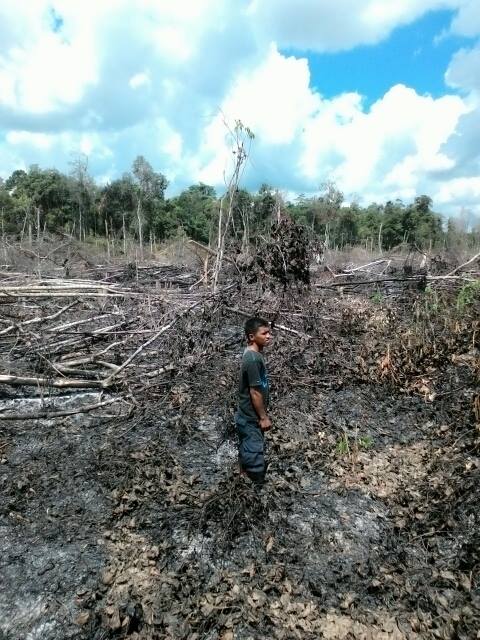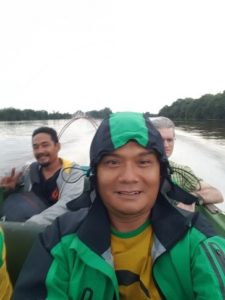People's Trust for Endangered Species (PTES) have been supporting the Orangutan Foundation's work in Indonesian Borneo for a number of years. We would like to share this Q & A with PTES and our Indonesian Programme Manager, Ade Soeharso, as part of the launch of their new appeal to save orangutan habitat.
Orangutan expert and Programme Manager at the Orangutan Foundation, Dr Ade Soeharso, answers some questions about the lives of orangutans, the dangers they are facing and ways anyone can save them now.

When did you start working at the Orangutan Foundation?
I’ve been a partner of the Orangutan Foundation since 2006. I was still working for the government then. Between 2008-2014 I worked part-time as a technical advisor of the Orangutan Foundation, and since 2015 I’ve worked full-time for the Orangutan Foundation.
What is the ideal habitat for an orangutan?
The ideal orangutan habitat is a mixture of swamp forest, lowland dry forest, and mountain forest. Ideally the habitat would be undisturbed and have an abundance of trees for food and nesting.
What is a protected forest?
In Indonesia, a protected forest is a one where the underlying area is protected from being logged or converted to other uses by land clearing.
What is palm oil? Why is the production of it so destructive?
Palm oil is a vegetable fat produced from oil-palm fruit. Almost all food products and many other common items use palm oil as a raw material. Therefore, palm oil is produced in large quantities because there is a huge market. Unfortunately, production of palm oil requires very large areas and which is achieved by cutting down large numbers of trees, which we call forest conversion and land clearing.
What have you found the hardest thing about working on the project so far?
The conservation of forests and the animals that depend on them is still often seen as less important than economic and development issues. It is challenging to mobilize the support of the parties in forest conservation efforts.
What is causing conflict between wildlife and the human population?
Due to deforestation, the amount of wildlife habitat left is ever decreasing. This means that the potential conflict between humans and orangutans will only increase. Orangutans and many other animals such as crocodiles, bears, and monkeys are forced out of the degraded forest and end up in community settlements and plantations in search of food. Seen as pests, they are often shot. We make sure that where possible, wild animals are translocated back into safe habitat. This is only possible if there is safe habitat left to move them back to.
What do you enjoy most about working with orangutans?
I enjoy it so much when I could see orangutans who have been rescued and then released growing and thriving in well-preserved habitat, successfully raising families of their own.
What time do you have to get up in the morning? Are orangutans early risers?
I get up early at 5:30 am. In the forest, orangutans rise between 5:00-5.30 am and leave their nests to set off in search of food.
How do you manage not to get lost in the forest when you’re following apes?
Basically, when following apes we’re never alone. There are always at least two people. As well as helping record data and times, they are locals who are more familiar with the forests so that we don’t get lost.
How many orangutans have you and your colleagues saved recently?
In 2017, so far we have saved 14 orangutans. Some of them have been released already as they are mature and well enough. The others are in the soft release programme. They are taken out into the forest each day to practice feeding and climbing until they have mastered the basic skills and are ready to be released.
Are you optimistic about the future for orangutans?
I am optimistic that orangutans can still be saved as long as we focus on saving their forests that are an integral part of their lives.
What must happen to ensure their survival?
We have to encourage the creation of sustainable oil-palm plantations and stop forest conversion in orangutan habitat and prevent the occurrence of forest fires. We also have to ensure that law enforcement act so that no more orangutans are traded as pets.
What can our supporters do to help?
As well as donating to this project, if you are buying a product that is made using palm oil, look out for ‘sustainable palm oil’ on the label. Currently, the global area already being used for oil palm production is sufficient to meet our needs without any further loss of forest. It is possible for us to use oil-palm produced from sustainable palm oil plantations and it is something we can all to do.
Please help us to help orangutans today so that they are still here tomorrow.






